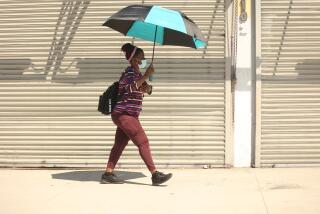Hot Days Mean Hot Tempers : Busy Air-Conditioning Technicians Get Little Sympathy
- Share via
When it gets as hot as it has this week, people get hot under the collar.
Just ask Susan Clarke, a dispatcher for Robert Air in Valencia who juggles telephone calls from people whose cooling units are on the blink.
“People in California think they’re dying if they don’t have air conditioning, even when it’s only 80 degrees,” said Clarke, an ex-New Yorker who often tells boiling customers they’ll have to wait a week or longer for service.
“If they get upset, I try to assure them they’re always right, no matter what,” she said. But “if they don’t like having to wait, I tell them there are always other companies they can go to.”
An idle air-conditioning technician during this week’s triple-digit heat in the Santa Clarita Valley, however, is as rare as a snowmobile salesman in Acapulco.
Keith Bruecker, who Clarke sends out in response to distress calls, has been working from dawn’s early light to well past sundown and he has to keep his cool even when those around him are losing theirs. Although many breakdowns are caused by a lack of regular maintenance, the overheated homeowners are usually in no mood to take responsibility.
“They’re hot. They’re frustrated. They’ve given our dispatcher an earful,” Bruecker said of the customers, who sometimes tell dispatchers they’ll serve him cold drinks to get their names bumped higher on his appointment list. “They ask her, ‘Why can’t he come over right now? He’s in the area, isn’t he?’ They don’t think anybody else is important. They think only their air conditioner has gone out.”
Although systems are built to last at least 20 years, Bruecker said they often succumb after only five if not properly maintained.
“When the systems get dirty, it affects air flow,” Bruecker said. “They have to work harder--often too hard--to put out cold air.”
Some service companies give higher priority to repair jobs at commercial or office buildings than at residences. “We try to take care of doctors’ offices or restaurants first because a faulty system affects large numbers of people,” said Gary Richardson, who owns a Valencia repair firm.
Many concede that taking heat from customers goes with the territory. “People are mad at themselves for waiting until the last minute, so they need to take it out on somebody else, I guess,” said Shelley Friedenberg a dispatcher for Air Champion Inc. of Newhall, which has installed and serviced residential and commercial cooling systems in the Santa Clarita Valley since 1953.
Denise Gallardo of Mar-Co Air-Conditioning in Canyon Country agrees.
“They can be the biggest grumps on the phone,” she said. “But then, after we get there and do the work, they’ve suddenly forgotten how long they had to wait. We’re now their savior.”
Homeowner Ron Alexander of Canyon Country knows getting immediate repairs is difficult, so he doesn’t sweat it. He called last Friday, scheduled a repair for Tuesday and then went out of town.
“If you call early and don’t say you need help right then, you can deal with it,” Alexander said.
The minor repair his system required cost $160, which he said was “a lot better than paying $4,500 for a whole new system.”
The operator of a Saugus bowling alley where the air conditioning balked this week said customers would have fled had he not been able to get it up and running.
“The more people who come in here, the warmer it gets--and if we don’t have air for very long, you can kiss a place like this goodby,” said Dave McKee, general manager of Santa Clarita Lanes.
Bruecker, who had started his work day at 6:30 a.m., showed up about 4:30 p.m. Tuesday to replace the compressors on four of the alley’s 19 units. He didn’t stop working on the broiling roof until 8:30 p.m. and then returned to finish the job Wednesday.
Repair technicians deserve praise, not scorn, said McKee. “On hot days like these, they’re busy, they’ve got a lot of places to go and they take longer to go everywhere they’re needed,” he said. “People need to understand that.”
More to Read
Sign up for Essential California
The most important California stories and recommendations in your inbox every morning.
You may occasionally receive promotional content from the Los Angeles Times.













